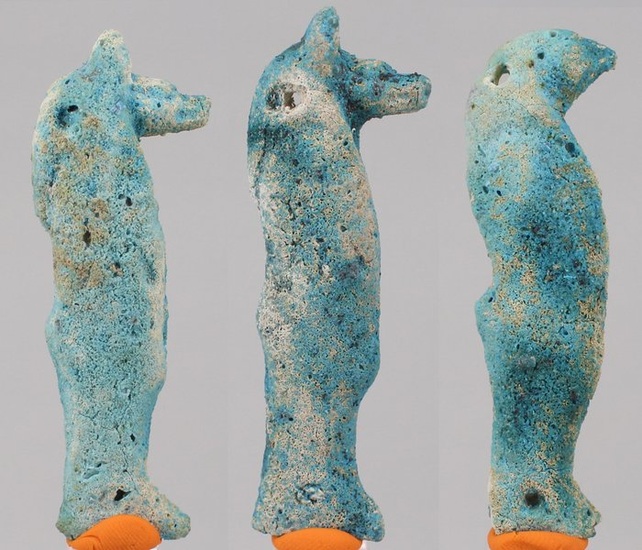Ancient Egyptian faience Sons of Horus 6.8 / 6.7 / 6.9 cm. - Late Period, c. 664 to 525 BC
Here are many ancient Egyptian deities who took care of the protection of the dead. Very interesting, however, are these 4 (the sons of Horus) , whose existence dates back at least to the Old Kingdom (ca. 2613-2160 BC) . Over time, each of the Sons of Horus has been identified as the protector of one of the internal organs removed from the body during mummification. The stomach was protected by Duamutef, the liver by Imsety, the lungs by Hapy, and the bowels by Qebehsenuef. Imsety, the human-headed son of Horus, protected the deceased's liver and was in turn protected by the goddess Isis. His role was to ensure that the dead would make it to the afterlife, as he was asked by Horus to lift them: 'You came to N; get under him and pick him up, don't be far from him, (even) N, in your name Imsety. " Imsety, the human-headed son of Horus, protected the deceased's liver and was in turn protected by the goddess Isis. His role was to ensure that the dead would make it to the afterlife, as he was asked by Horus to lift them: 'You came to N; get under him and pick him up, don't be far from him, (even) N, in your name Imsety. " Duamutef, the jackal-headed son of Horus, protected the stomach of the deceased and was in turn protected by the goddess Neith. It seems that his role was to worship the dead person and his name literally means "the one who worships his mother". In the Coffin Texts, Horus calls upon him: "Come and worship my father N for me, just as you went to worship my mother Isis in your name Duamutef. " Qebehsenuef was the falcon-headed son of Horus and protected the entrails of the deceased. He, in turn, was protected by the goddess Serket. It seems that his role was to refresh the dead person and his name literally means "he who waters his siblings". Horus commands him: “Come, refresh my father; go to him in your name from Qebehsenuef. You came to cool him down after you. . . " Provenance: Previous ownership history: Private Collection T. Gauthier Collected before 1980. I have acquired object in 2014 in France from Jerome Rousseau. Important information. The seller that he is entitled to ship this lot guarantees. The seller will take care that any necessary permits will be arranged. The authenticity of the item is unconditionally guaranteed. Send by DHL The seller that he acquired this piece in a legal manner guarantees. Documentation proving this provenance has been seen by Catawiki.
[ translate ]View it on
Sale price
Estimate
Time, Location
Auction House
Here are many ancient Egyptian deities who took care of the protection of the dead. Very interesting, however, are these 4 (the sons of Horus) , whose existence dates back at least to the Old Kingdom (ca. 2613-2160 BC) . Over time, each of the Sons of Horus has been identified as the protector of one of the internal organs removed from the body during mummification. The stomach was protected by Duamutef, the liver by Imsety, the lungs by Hapy, and the bowels by Qebehsenuef. Imsety, the human-headed son of Horus, protected the deceased's liver and was in turn protected by the goddess Isis. His role was to ensure that the dead would make it to the afterlife, as he was asked by Horus to lift them: 'You came to N; get under him and pick him up, don't be far from him, (even) N, in your name Imsety. " Imsety, the human-headed son of Horus, protected the deceased's liver and was in turn protected by the goddess Isis. His role was to ensure that the dead would make it to the afterlife, as he was asked by Horus to lift them: 'You came to N; get under him and pick him up, don't be far from him, (even) N, in your name Imsety. " Duamutef, the jackal-headed son of Horus, protected the stomach of the deceased and was in turn protected by the goddess Neith. It seems that his role was to worship the dead person and his name literally means "the one who worships his mother". In the Coffin Texts, Horus calls upon him: "Come and worship my father N for me, just as you went to worship my mother Isis in your name Duamutef. " Qebehsenuef was the falcon-headed son of Horus and protected the entrails of the deceased. He, in turn, was protected by the goddess Serket. It seems that his role was to refresh the dead person and his name literally means "he who waters his siblings". Horus commands him: “Come, refresh my father; go to him in your name from Qebehsenuef. You came to cool him down after you. . . " Provenance: Previous ownership history: Private Collection T. Gauthier Collected before 1980. I have acquired object in 2014 in France from Jerome Rousseau. Important information. The seller that he is entitled to ship this lot guarantees. The seller will take care that any necessary permits will be arranged. The authenticity of the item is unconditionally guaranteed. Send by DHL The seller that he acquired this piece in a legal manner guarantees. Documentation proving this provenance has been seen by Catawiki.
[ translate ]


